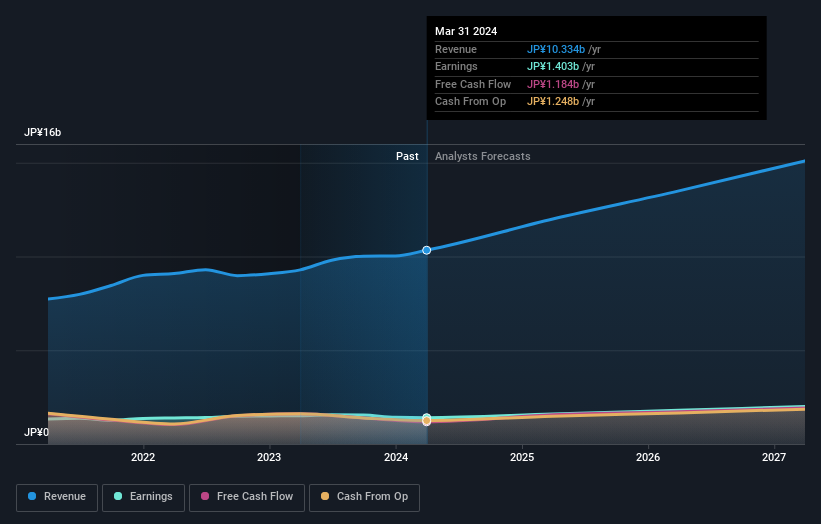AlphaPolis Co., Ltd.'s (TSE:9467) largest shareholder, CEO Yusuke Kajimoto sees holdings value fall by 17% following recent drop

Key Insights
- AlphaPolis' significant insider ownership suggests inherent interests in company's expansion
- Yusuke Kajimoto owns 70% of the company
- 14% of AlphaPolis is held by Institutions
A look at the shareholders of AlphaPolis Co., Ltd. (TSE:9467) can tell us which group is most powerful. With 71% stake, individual insiders possess the maximum shares in the company. Put another way, the group faces the maximum upside potential (or downside risk).
As a result, insiders as a group endured the highest losses after market cap fell by JP¥3.5b.
Let's take a closer look to see what the different types of shareholders can tell us about AlphaPolis.
View our latest analysis for AlphaPolis

What Does The Institutional Ownership Tell Us About AlphaPolis?
Many institutions measure their performance against an index that approximates the local market. So they usually pay more attention to companies that are included in major indices.
AlphaPolis already has institutions on the share registry. Indeed, they own a respectable stake in the company. This implies the analysts working for those institutions have looked at the stock and they like it. But just like anyone else, they could be wrong. It is not uncommon to see a big share price drop if two large institutional investors try to sell out of a stock at the same time. So it is worth checking the past earnings trajectory of AlphaPolis, (below). Of course, keep in mind that there are other factors to consider, too.

AlphaPolis is not owned by hedge funds. The company's CEO Yusuke Kajimoto is the largest shareholder with 70% of shares outstanding. With such a huge stake, we infer that they have significant control of the future of the company. It's usually considered a good sign when insiders own a significant number of shares in the company, and in this case, we're glad to see a company insider with such skin in the game. Meanwhile, the second and third largest shareholders, hold 3.9% and 2.1%, of the shares outstanding, respectively.
While it makes sense to study institutional ownership data for a company, it also makes sense to study analyst sentiments to know which way the wind is blowing. While there is some analyst coverage, the company is probably not widely covered. So it could gain more attention, down the track.
Insider Ownership Of AlphaPolis
The definition of an insider can differ slightly between different countries, but members of the board of directors always count. Management ultimately answers to the board. However, it is not uncommon for managers to be executive board members, especially if they are a founder or the CEO.
Insider ownership is positive when it signals leadership are thinking like the true owners of the company. However, high insider ownership can also give immense power to a small group within the company. This can be negative in some circumstances.
It seems that insiders own more than half the AlphaPolis Co., Ltd. stock. This gives them a lot of power. So they have a JP¥12b stake in this JP¥17b business. Most would argue this is a positive, showing strong alignment with shareholders. You can click here to see if those insiders have been buying or selling.
General Public Ownership
With a 14% ownership, the general public, mostly comprising of individual investors, have some degree of sway over AlphaPolis. This size of ownership, while considerable, may not be enough to change company policy if the decision is not in sync with other large shareholders.
Next Steps:
While it is well worth considering the different groups that own a company, there are other factors that are even more important.
Many find it useful to take an in depth look at how a company has performed in the past. You can access this detailed graph of past earnings, revenue and cash flow.
If you would prefer discover what analysts are predicting in terms of future growth, do not miss this free report on analyst forecasts.
NB: Figures in this article are calculated using data from the last twelve months, which refer to the 12-month period ending on the last date of the month the financial statement is dated. This may not be consistent with full year annual report figures.
New: Manage All Your Stock Portfolios in One Place
We've created the ultimate portfolio companion for stock investors, and it's free.
• Connect an unlimited number of Portfolios and see your total in one currency
• Be alerted to new Warning Signs or Risks via email or mobile
• Track the Fair Value of your stocks
Have feedback on this article? Concerned about the content? Get in touch with us directly. Alternatively, email editorial-team (at) simplywallst.com.
This article by Simply Wall St is general in nature. We provide commentary based on historical data and analyst forecasts only using an unbiased methodology and our articles are not intended to be financial advice. It does not constitute a recommendation to buy or sell any stock, and does not take account of your objectives, or your financial situation. We aim to bring you long-term focused analysis driven by fundamental data. Note that our analysis may not factor in the latest price-sensitive company announcements or qualitative material. Simply Wall St has no position in any stocks mentioned.
Have feedback on this article? Concerned about the content? Get in touch with us directly. Alternatively, email editorial-team@simplywallst.com
About TSE:9467
AlphaPolis
Engages in Internet site management and books publishing businesses in Japan.
Undervalued with excellent balance sheet.

